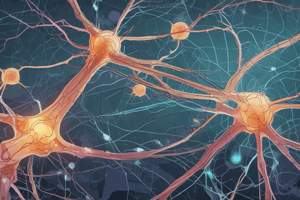Podcast
Questions and Answers
What is defined as the level that must be depolarized to generate an action potential?
What is defined as the level that must be depolarized to generate an action potential?
- Repolarization level
- Hyperpolarization threshold
- Resting potential
- Threshold potential (correct)
Which term is synonymous with action potential?
Which term is synonymous with action potential?
- Resting state
- Nerve impulse (correct)
- Graded potential
- Synaptic transmission
What happens once the threshold potential is reached?
What happens once the threshold potential is reached?
- Graded potentials cease to exist
- An action potential is generated (correct)
- The membrane goes back to resting potential immediately
- The neuron becomes hyperpolarized
Which of the following is NOT a characteristic of threshold potential?
Which of the following is NOT a characteristic of threshold potential?
Why is the threshold potential important in neural communication?
Why is the threshold potential important in neural communication?
What is the refractory period in the context of action potentials?
What is the refractory period in the context of action potentials?
Which statement accurately describes the absolute refractory period?
Which statement accurately describes the absolute refractory period?
What occurs during the refractory period of an action potential?
What occurs during the refractory period of an action potential?
How does the refractory period contribute to the functioning of neurons?
How does the refractory period contribute to the functioning of neurons?
Which characteristic differentiates the absolute refractory period from the relative refractory period?
Which characteristic differentiates the absolute refractory period from the relative refractory period?
What occurs during depolarization of the membrane?
What occurs during depolarization of the membrane?
What ionic movement is primarily responsible for repolarization?
What ionic movement is primarily responsible for repolarization?
What is the membrane's state during hyperpolarization?
What is the membrane's state during hyperpolarization?
Which of the following correctly describes a consequence of depolarization?
Which of the following correctly describes a consequence of depolarization?
What occurs immediately following depolarization?
What occurs immediately following depolarization?
What is the significance of reaching the threshold potential in neural activity?
What is the significance of reaching the threshold potential in neural activity?
Which statement accurately describes the threshold potential?
Which statement accurately describes the threshold potential?
What immediately follows the reaching of the threshold potential in a neuron?
What immediately follows the reaching of the threshold potential in a neuron?
Which of the following best describes the changes occurring during the threshold potential phase?
Which of the following best describes the changes occurring during the threshold potential phase?
Which factors influence the threshold potential in neurons?
Which factors influence the threshold potential in neurons?
Flashcards are hidden until you start studying
Study Notes
Action Potential
- Action Potential is also known as nerve impulse
- The minimum membrane potential that must be depolarized to generate an action potential is called the threshold potential
- The refractory period is the time when no new action potential can be initiated
- There are two types of refractory periods:
- Absolute Refractory Period: No new action potential can be generated, even with a strong stimulus
- Relative Refractory Period: A second action potential can be produced by a very strong stimulus
Comparing Graded Potentials and Action Potentials
- Graded potentials do not reach the threshold level
- Action potentials reach the threshold level and cause depolarization
- Graded potentials cause local changes in membrane potential
- Action potentials cause depolarization to the threshold level
Action Potential
- Action potential or nerve impulse is a physiological event that occurs in an excitable cell
- The membrane potential of the cell rapidly rises and falls, following a specific pattern.
Threshold
- The membrane potential level required to generate an action potential is known as the threshold potential.
- Depolarization occurs when the membrane becomes less negative than at resting potential.
- The influx of Na+ ions causes depolarization.
Repolarization
- Repolarization involves the membrane returning to its resting potential after depolarization.
- Efflux of K+ ions is responsible for repolarization.
Hyperpolarization
- Hyperpolarization is when the membrane becomes more negative than at resting potential.
- The ionic causes behind hyperpolarization are not mentioned in the provided text.
Potential Changes
- There are two types of potential changes: graded potentials and action potentials.
Graded Potentials
- Graded potentials are local changes in membrane potential.
- They serve as short-distance signals.
- For example, a change in RMP from -70 mV to -60 mV is considered a graded potential.
- Na+ entry into a small, specialized region of the plasma membrane causes graded potentials.
- Graded potentials can be summated with stronger stimuli.
Action Potentials
- Action potentials serve as long-distance signals.
Studying That Suits You
Use AI to generate personalized quizzes and flashcards to suit your learning preferences.




